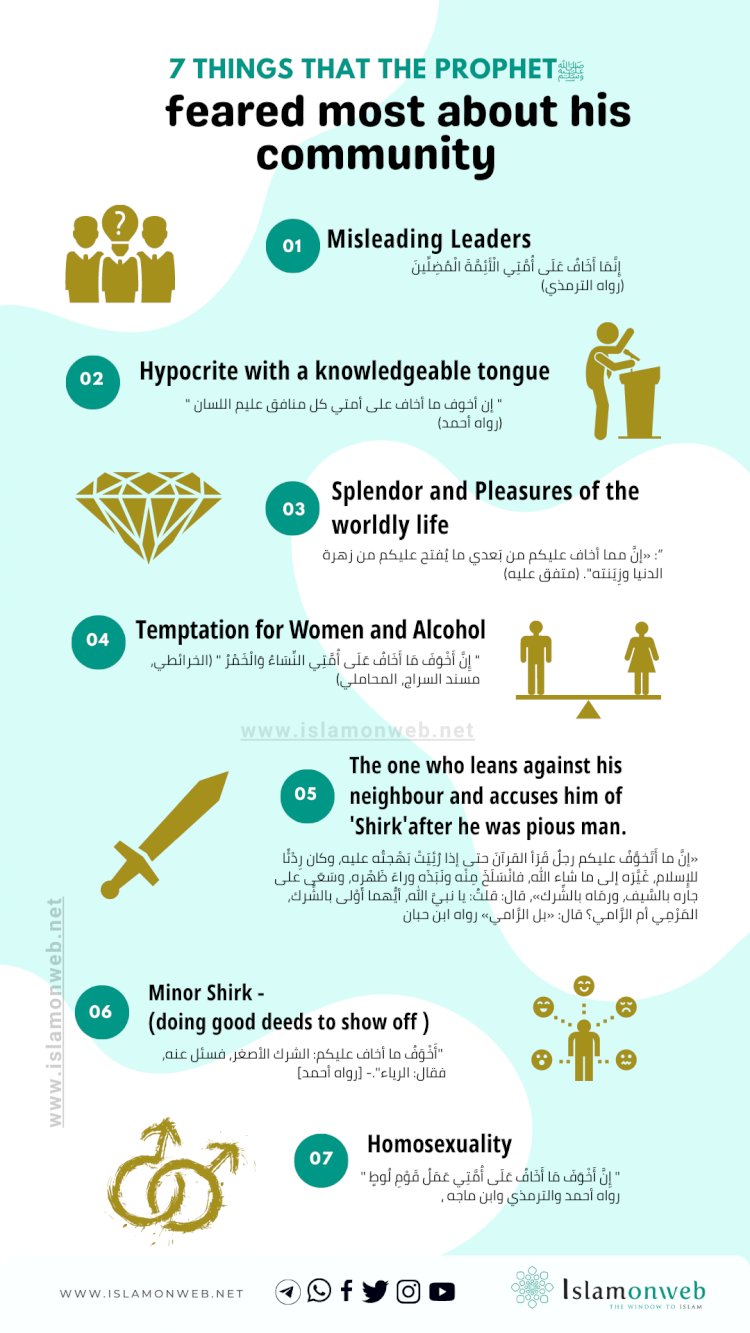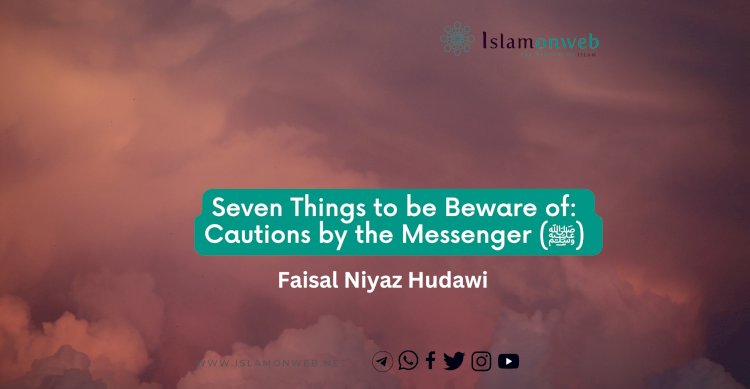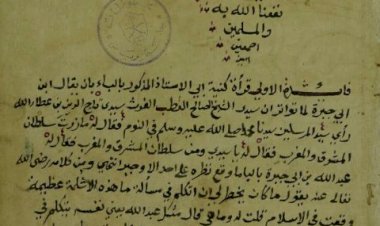Seven Things to be Beware of: Cautions by the Messenger (ﷺ)

We will explore here seven things that Messenger Muhammad (ﷺ) feared the most about his Ummah.
1- Misguiding Leaders
Prophet Muhammad (ﷺ) was very concerned about the impact of misleading leaders on his community. He knew that leaders play a crucial role in shaping the values and beliefs of people, and if they are not righteous, they can lead people astray. The Messenger (ﷺ) warned his community about the dangers of following leaders who are corrupt and misguided.
This is a hadith from Thawbān, who reported that the Messenger (ﷺ) said:
"Verily, I fear for my nation, the misguiding leaders." (Tirmidhi)
عَنْ ثَوْبَانَ قَالَ قَالَ رَسُولُ اللَّهِ صَلَّى اللَّهُ عَلَيْهِ وَسَلَّمَ: إِنَّمَا أَخَافُ عَلَى أُمَّتِي الْأَئِمَّةَ الْمُضِلِّينَ (رواه الترمذي)
2- Hypocrite with a knowledgeable tongue
The Messenger (ﷺ) also cautioned about the hypocrites who were knowledgeable and eloquent in speech. These individuals would pretend to be pious and righteous, but in reality, they are far from it. They would use their knowledge and eloquence to argue and fight with others and misguide people and create confusion. The Messenger (ﷺ) warned his followers to be wary of such individuals and to focus on their own faith and deeds.
He said, "The thing I fear most for my nation is every hypocrite with a knowledgeable tongue" (Ahmad).
عن عمر بن الخطاب، أن رسول الله صلى الله عليه وسلم، قال: " إن أخوف ما أخاف على أمتي كل منافق عليم اللسان" (رواه أحمد)
3- Splendor and pleasures of the worldly life
The Messenger (ﷺ) understood that worldly comforts and temptations could distract people from their faith and lead them astray. He warned his followers to be careful of the allure of material possessions and to focus on the afterlife.
Abu Sa‘īd al-Khudri (may Allah be pleased with him) reported: The The Messenger (ﷺ) once sat on the pulpit, and we sat around him. He said:
"Verily, among the things I fear the most for you is the splendor and pleasures of this worldly life when they become plentifully available to you."
عن أبي سعيد الخُدْرِي رضي الله عنه قال: جلس رسول الله صلى الله عليه وسلم على المِنْبَر، وجلسنا حوله، فقال”: «إنَّ مما أخاف عليكم من بَعدي ما يُفتح عليكم من زهرة الدنيا وزِيَنته". (متفق عليه)
4- Temptation towards Women and Alcohol
The Messenger (ﷺ) has warned us against the temptation towards an illicit relationship with women and the use of alcohol and other narcotics. The hadith emphasizes the importance of self-control and discipline in the face of temptation and highlights the responsibility of men to avoid behaving inappropriately towards women. These desires could engulf people and lead them away from the path of righteousness. The Messenger (ﷺ) advises us to guard our chastity and to avoid anything that could lead us towards illicit desires. In one hadith, he states that there is no trial or tribulation that is more harmful to men than women.
On the authority of Ali ibn Abi Talib (may Allah be pleased with him), he said: The Messenger (ﷺ) said,
"Verily, the thing that I fear most for my nation are women and wine."
عن علي بن أبي طالب رضي الله عنه قال : قال رسول الله صلى الله عليه وسلم : إن أخوف ما أخاف على أمتي النساء والخمر.
5- Accusation of Shirk
The Messenger (ﷺ) was concerned about those who would accuse others of shirk (associating partners with Allah) without any evidence or justification. These individuals could cause divisions and misunderstandings within the community, leading to the loss of faith of many. It will also end up in internal conflict among Muslims. He warned his followers to be just and to avoid making baseless accusations.
The Messenger (ﷺ) said:
"Verily, what I fear for you is a man who recites the Qur’an until its brightness appears on him and he becomes the support for Islam. (This continues) until this man changes his state to what Allah wills. He detaches himself from it and throws it behind his back. Then he starts attacking his neighbour with the sword, accusing him of shirk (polytheism)." I asked: "O Prophet, which of the two deserves more to be described as a polytheist? The accused or the accuser?" He replied: "The accuser." (Ibn Hibban).
عن حذيفة رضي الله عنه قال: قال رسول الله صلى الله عليه وسلم : «إنَّ ما أَتَخوَّفُ عليكم رجلٌ قَرَأ القرآنَ حتى إذا رُئِيَتْ بَهْجتُه عليه، وكان رِدْئًا للإِسلام، غَيَّرَه إلى ما شاء الله، فانْسَلَخَ مِنْه ونَبَذَه وراءَ ظَهْرِه، وسَعَى على جاره بالسَّيف، ورمَاه بالشِّرك»، قال: قلتُ: يا نبيَّ الله، أيُّهما أوْلى بالشِّرك، المَرْمِي أم الرَّامي؟ قال: «بل الرَّامي». [حسن] - [رواه ابن حبان[
6- Minor Shirk (idolatry)
The Messenger (ﷺ) warned us against minor shirk (idolatry or polytheism) and urged us to be vigilant in avoiding it. He explained minor shirk as showing off.
Minor shirk refers to acts of associating partners with Allah that are less severe than major shirk, which is an act of associating partners with Allah in worship. Showing off, or Riyā’ in Arabic, is one example of minor shirk. It is when someone performs an act of worship to gain praise or recognition from people rather than to seek the pleasure of Allah.
This hadith emphasizes the importance of sincerity in worship and the need to avoid showing off. Muslims are called to worship Allah with pure intentions and sincerity, seeking His pleasure alone. The Messenger (ﷺ) warned that showing off can nullify the reward of one's good deeds and lead to hypocrisy. Therefore, Muslims should strive to purify their intentions and avoid seeking recognition or praise for their acts of worship.
In the hadith, narrated by Mahmoud bin Labeed (may Allah be pleased with him), the Messenger (ﷺ) said,
"The thing I fear most for you is minor shirk, and when he was asked about it, he said: it is showing off."
عن محمود بن لبيد رضي الله عنه مرفوعاً: "أَخْوَفُ ما أخاف عليكم: الشرك الأصغر، فسئل عنه، فقال: الرياء". – رواه أحمد
7-Homosexuality
The Messenger (ﷺ) also warned us about the dangers of homosexuality. This behaviour goes against the natural order of things and could lead to the destruction of families and societies. The people of Lot were a community destroyed by Allah due to their immoral behaviour, including homosexuality. The Messenger (ﷺ) warned his followers that engaging in similar acts could lead to disastrous consequences.
When more and more countries and societies legalize same-gender sex and marriage and try to spread immorality in the name of LGBTQ+ rights, the words of the Messenger (ﷺ) on this immoral behaviour are very much relevant and important.
In the hadith narrated by Jabir, the Messenger (ﷺ) said,
"Verily, the thing I fear most for my nation is the action of the people of Lot."
عَنْ عَبْدِ اللَّهِ بْنِ مُحَمَّدِ بْنِ عَقِيلٍ ، أَنَّهُ سَمِعَ جَابِرًا يَقُولُ : قَالَ رَسُولُ اللَّهِ صَلَّى اللَّهُ عَلَيْهِ وَسَلَّمَ) : إِنَّ أَخْوَفَ مَا أَخَافُ عَلَى أُمَّتِي عَمَلُ قَوْمِ لُوطٍ ) رواه أحمد والترمذي وابن ماجه
May Allah help us all to stay away from these sins and to be steadfast in the right path – Āmīn
About the author:
Faisal Niyaz Hudawi is a postgraduate of Darul Huda Islamic University, Kerala, India, in Islamic Studies. His research interests include Islamic economics and finance, as well as Muslim world politics. He is interested in digital activism and founded Islamonweb.net and thesite.in. He has been a resident of Qatar for more than 12 years
Disclaimer
The views expressed in this article are the author’s own and do not necessarily mirror Islamonweb’s editorial stance.

























Leave A Comment